August 2, 2015 spells 25 years since the Iraqi invasion of Kuwait. Wars were fought, a dictator brought to his knees and lives torn asunder ever since. As expatriates caught in the crossfire of two warring nations, my family and I were among the thousands of Indian refugees evacuated from Kuwait in what was the largest such operation internationally by our government in 1990. I was an 11-year-old back then and chronicled every moment from in a diary. Here is some of my story... one I cannot wait to tell my grandchildren
"Iraq has invaded Kuwait"
Vacation time in Mangalore came to an end and our family of three landed at Kuwait airport on 30 July 1990 to get back to our routine lives. It took us a few days to get our moorings and out of holiday mode. Years later, in the safety of our own country, my parents told me that there had been a lot of talk of the imminent danger that Iraq posed to Kuwait.
"Most of us were jolted awake on the morning of 2 August with the sound of the Sabahiyah Tower (a key communications link) being blown up."
Talks to settle oil-related disputes finally failed on August 1, 1990. That was the last night that Kuwait would be a free country for a while to come. Little did we know that this speck of a country would have the world riveted in a few hours.
Most of us were jolted awake on the morning of 2 August with the sound of the Sabahiyah Tower (a key communications link) being blown up. None of us expected an invasion to be in progress. Phone lines were soon down, though electricity and water remained in place. I still remember walking into the hall of our 2nd floor apartment rubbing sleep out of my eyes to see dad staring out of the window. Over his shoulder I could see billowing smoke from the Sabahiyah Tower. I asked dad, "What's happening?" Tuning in to BBC radio was our only means of knowing what was going on and those words will forever ring in my ears: "Iraq has invaded Kuwait".
A diary full of memories
Dad told me that I was now a part of history in the making and that I should maintain a diary of all that happens. It took a while for me to understand some of the political intricacies of the invasion, but one thing my diary was full of were numerous experiences that will stay with me forever.
![2015-07-28-1438079798-8698267-SNC00714.jpg]()
My diary - a day-by-day chronicle of the invasion as it unfolded
On 3 August 1990 I got a glimpse of the invading army for the first time. The local fish market was one of their designated headquarters. The soldiers were sitting along the arches that surrounded the market and were gorging on mangoes. I waved out to a truck load of them and was quite thrilled when they waved back at me. I was from grinning ear to ear, as were they. This was in the first few days of the invasion when things did not really seem amiss.
"The soldiers were sitting along the arches that surrounded the market and were gorging on mangoes. I waved out to a truck load of them and was quite thrilled when they waved back at me."
Food was freely available, despite which panic among people had led to hoarding. When we were at the market one day a riot broke out and three of the four entrances were sealed in order to quell the fight. There was a lot of screaming and shouting, shoving and pushing. I remember being surrounded by my parents and family friends and being huddled out through the manager's chambers. I can still look back and see the market as we drove away from it, wondering dazedly what had just happened.
"We will die together"
The sounds of one terrifying night on 29 August 1990 will remain with me forever. We lived on the outskirts of Kuwait close to the oil refineries. Several battalions of Saddam's armies had made the schools in our areas their watch points. As the political tension continued to build up on whether to use military force to oust Iraq from Kuwait, Saddam Hussein issued an ultimatum to the American embassy in Kuwait that night. They were to vacate the embassy by midnight or else come under the direct attack of Saddam's men.
Somewhere from the depths of my sleep that night I felt the bed vibrating beneath me. Groggily I put my hand against the wall and found the vibration intensifying. As my senses began to wake I could hear the dull thud of explosions which soon became deafeningly loud. Tanks, grenades, semi-automatic guns all seemed to be pounding the air close to us. I remember whimpering under my covers. Soon a reassuring pair of hands carried me from my bed and my mother gently placed me between my dad and her. I remember being bear hugged by both of them and hearing the constant chant of prayers being whispered in my ears. The intention was clear that night, if we had to die, we would die together. The bombardment finally stopped and we later learned that there was no specific target. What the Iraqis in fact did was to conduct a military exercise in the middle of the night that happened to coincide with embassy deadline. They won both ways -- they had their exercise and they frightened the entire country.
The exodus
The organised evacuation by the Indian government in Kuwait was to be the largest ever undertaken by any country in the world. The plan of action was that a convoy of buses (160 at a given time) was to leave Kuwait, cross the breadth of Iraq into Jordon. Here we would be in camps that were set up by the Red Cross until the already overcrowded Jordon airport could accommodate us until our flight out of the country.
"Tanks, grenades, semi-automatic guns all seemed to be pounding the air close to us. I remember whimpering under my covers."
Emotions were running high that day. Homes that were painstakingly built over the years had to be left behind as they were. We were only allowed to carry as much we could physically lug ourselves. That came practically close to nothing. I still remember dad telling mom not to look back as we locked the door to our home, just as though we would be back in an hour. How my mother would have felt at leaving behind a home she had made for 16 years is something I will never be able to fathom.
We left Kuwait at 12.45pm on 27 September 1990. It is a small country and very soon we were at the border of Kuwait and Iraq. Call it an omen of sorts, but our bus broke down at the border in such a way that those in the front of the bus were in Iraq and those at the back were in Kuwait!
That evening we were in Saddam Hussein's land. All over the vast desert land of Iraq were his hoardings. Officials of the Indian government directed us to hotels for the night. Fifty of us were put up in two rooms. There was one toilet for us all, with no water and only one bed that was covered in vomit. The women slept on the floor, the children on the bed and the men took turns in guarding the luggage in the bus.
The next day we were to proceed to Jordon and to the main camp, Al-Azraq. Once we crossed the borders of Iraq into Jordon, we were in no man's land. A few minutes in to the journey, our bus was stopped and armed soldiers got on to the bus demanding to see our passports. Their guns moved menacingly in our faces. A lady who had served the hard life of a domestic help in Kuwait was so terrified that she handed over her wallet that had all her gold and life savings along with her passport. The soldier grinned broadly, pocketed the wallet, and continued with a cursory check.
"Fifty of us were put up in two rooms. There was one toilet for us all, with no water and only one bed that was covered in vomit."
My mother was sitting at a window seat with a scarf over her head and glasses. To understand what happened next, you need to know that westerners, especially US citizens, were often detained by Iraqi soldiers and many had tried escaping in disguise. My mother is really fair complexioned and the soldier stopped next to my parents and asked my father from which part of India we were. On hearing we were from South India, he questioned my mother's complexion rather menacingly. Everyone's heart was at a standstill. There was nothing stopping the soldier from making my parents get off the bus at gunpoint. Dad said the one thing that came to his mind. "Her colour is from God." The soldier asked if we were Christians to which my father replied in the affirmative. The soldier said he was too and continued on his way.
Back to basics
Four hours into the bus drive we were unloaded at an unruly camp called Shalaan II. Officials told us that Al-Azraq, where we were supposed to be, was bursting at the seams and needed a day to clear the people that were already there. We would be leaving for it the next day. We were allocated a tent and as soon as we got into it a sandstorm hit the camp and then a draft settled, plummeting the temperatures.
After a freezing cold night, as promised the next day, September 29, we reached Al-Azraq camp. This was to be home for the next five days. Red Cross greeted us at the entrance of the camp. We were informed that there were 130,000 people in the camp at that point. Every child on the bus was given a packet of milk and biscuits. We were allocated tents that could house 16 people at a time. We were provided with a stove, gas, a 30-pack of tinned sardines and a big cooking vessel. The floor of the tent was our bed.
![2015-07-28-1438079986-5015060-008.jpg]()
Al Azraq Camp - our home for five days
![2015-07-28-1438082131-6693563-0222.jpg]()
The cooking set up provided by the Red Cross
The next day we went exploring. Toilets were trenches covered with tin sheets--they were smelly but they had to do. There was a tent that substituted as a washroom for the women and we finally had a bath after five days on the road. Besides the Red Cross ration of rice, milk and apples, our men went foraging each day among the tents that were cleared out and often came back with goodies like a bar of chocolate, a tin of tea powder or even a packet of chewing gum. All such things were now luxuries to us refugees.
![2015-07-28-1438080067-2840145-026.jpg]()
Standing in line for Red Cross rations
We are going home
On 3 October, we were told that we would be leaving for Jordon airport. We dressed in a jiffy only to be told that we would be taken to yet another camp as Jordon airport just could not handle the refugee influx. That night we spent at camp Al-Andalus, very close to Amman airport. The security made it very clear that the tents were only for the women and children and that any man caught in a tent would be locked up, no questions asked.
"When we disembarked at Mumbai airport, it did us proud to see how much our country had done for us."
The temperature was around seven degrees and I still remember how all our mums enveloped us with their bodies to keep us warm. The next morning, a bus took us to the airport and we saw a multitude of people in lines that seemed to be snaking into eternity. The heavens smiled on us that day because we were suddenly herded on to an Emirates mercy flight that had just been pressed in to service much to the chagrin of the people who had been waiting for days.
![2015-07-28-1438080305-4431045-SNC00715.jpg]()
Our boarding pass on the Emirates mercy flight home
When we disembarked at Mumbai airport, it did us proud to see how much our country had done for us. There were representatives from every state at designated counters that were providing free travel to our respective home towns by train or bus. But we had had enough. We managed to board a one-hour flight the next day and reached our home town of Mangalore on 6 October 1990, approximately a week after we left Kuwait.
I am 37 years old today, and the memories are a bit hazy but echoes of it will follow me forever. After all, I was a part of history.
![]() Like Us On Facebook |
Like Us On Facebook |
![]() Follow Us On Twitter |
Follow Us On Twitter |
![]() Contact HuffPost India
Contact HuffPost India
"Iraq has invaded Kuwait"
Vacation time in Mangalore came to an end and our family of three landed at Kuwait airport on 30 July 1990 to get back to our routine lives. It took us a few days to get our moorings and out of holiday mode. Years later, in the safety of our own country, my parents told me that there had been a lot of talk of the imminent danger that Iraq posed to Kuwait.
"Most of us were jolted awake on the morning of 2 August with the sound of the Sabahiyah Tower (a key communications link) being blown up."
Talks to settle oil-related disputes finally failed on August 1, 1990. That was the last night that Kuwait would be a free country for a while to come. Little did we know that this speck of a country would have the world riveted in a few hours.
Most of us were jolted awake on the morning of 2 August with the sound of the Sabahiyah Tower (a key communications link) being blown up. None of us expected an invasion to be in progress. Phone lines were soon down, though electricity and water remained in place. I still remember walking into the hall of our 2nd floor apartment rubbing sleep out of my eyes to see dad staring out of the window. Over his shoulder I could see billowing smoke from the Sabahiyah Tower. I asked dad, "What's happening?" Tuning in to BBC radio was our only means of knowing what was going on and those words will forever ring in my ears: "Iraq has invaded Kuwait".
A diary full of memories
Dad told me that I was now a part of history in the making and that I should maintain a diary of all that happens. It took a while for me to understand some of the political intricacies of the invasion, but one thing my diary was full of were numerous experiences that will stay with me forever.
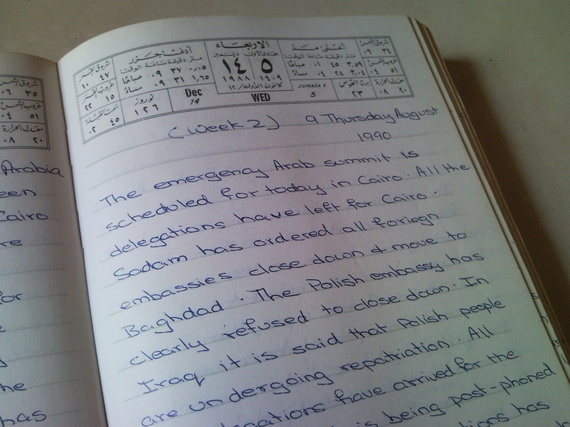
My diary - a day-by-day chronicle of the invasion as it unfolded
On 3 August 1990 I got a glimpse of the invading army for the first time. The local fish market was one of their designated headquarters. The soldiers were sitting along the arches that surrounded the market and were gorging on mangoes. I waved out to a truck load of them and was quite thrilled when they waved back at me. I was from grinning ear to ear, as were they. This was in the first few days of the invasion when things did not really seem amiss.
"The soldiers were sitting along the arches that surrounded the market and were gorging on mangoes. I waved out to a truck load of them and was quite thrilled when they waved back at me."
Food was freely available, despite which panic among people had led to hoarding. When we were at the market one day a riot broke out and three of the four entrances were sealed in order to quell the fight. There was a lot of screaming and shouting, shoving and pushing. I remember being surrounded by my parents and family friends and being huddled out through the manager's chambers. I can still look back and see the market as we drove away from it, wondering dazedly what had just happened.
"We will die together"
The sounds of one terrifying night on 29 August 1990 will remain with me forever. We lived on the outskirts of Kuwait close to the oil refineries. Several battalions of Saddam's armies had made the schools in our areas their watch points. As the political tension continued to build up on whether to use military force to oust Iraq from Kuwait, Saddam Hussein issued an ultimatum to the American embassy in Kuwait that night. They were to vacate the embassy by midnight or else come under the direct attack of Saddam's men.
Somewhere from the depths of my sleep that night I felt the bed vibrating beneath me. Groggily I put my hand against the wall and found the vibration intensifying. As my senses began to wake I could hear the dull thud of explosions which soon became deafeningly loud. Tanks, grenades, semi-automatic guns all seemed to be pounding the air close to us. I remember whimpering under my covers. Soon a reassuring pair of hands carried me from my bed and my mother gently placed me between my dad and her. I remember being bear hugged by both of them and hearing the constant chant of prayers being whispered in my ears. The intention was clear that night, if we had to die, we would die together. The bombardment finally stopped and we later learned that there was no specific target. What the Iraqis in fact did was to conduct a military exercise in the middle of the night that happened to coincide with embassy deadline. They won both ways -- they had their exercise and they frightened the entire country.
The exodus
The organised evacuation by the Indian government in Kuwait was to be the largest ever undertaken by any country in the world. The plan of action was that a convoy of buses (160 at a given time) was to leave Kuwait, cross the breadth of Iraq into Jordon. Here we would be in camps that were set up by the Red Cross until the already overcrowded Jordon airport could accommodate us until our flight out of the country.
"Tanks, grenades, semi-automatic guns all seemed to be pounding the air close to us. I remember whimpering under my covers."
Emotions were running high that day. Homes that were painstakingly built over the years had to be left behind as they were. We were only allowed to carry as much we could physically lug ourselves. That came practically close to nothing. I still remember dad telling mom not to look back as we locked the door to our home, just as though we would be back in an hour. How my mother would have felt at leaving behind a home she had made for 16 years is something I will never be able to fathom.
We left Kuwait at 12.45pm on 27 September 1990. It is a small country and very soon we were at the border of Kuwait and Iraq. Call it an omen of sorts, but our bus broke down at the border in such a way that those in the front of the bus were in Iraq and those at the back were in Kuwait!
That evening we were in Saddam Hussein's land. All over the vast desert land of Iraq were his hoardings. Officials of the Indian government directed us to hotels for the night. Fifty of us were put up in two rooms. There was one toilet for us all, with no water and only one bed that was covered in vomit. The women slept on the floor, the children on the bed and the men took turns in guarding the luggage in the bus.
The next day we were to proceed to Jordon and to the main camp, Al-Azraq. Once we crossed the borders of Iraq into Jordon, we were in no man's land. A few minutes in to the journey, our bus was stopped and armed soldiers got on to the bus demanding to see our passports. Their guns moved menacingly in our faces. A lady who had served the hard life of a domestic help in Kuwait was so terrified that she handed over her wallet that had all her gold and life savings along with her passport. The soldier grinned broadly, pocketed the wallet, and continued with a cursory check.
"Fifty of us were put up in two rooms. There was one toilet for us all, with no water and only one bed that was covered in vomit."
My mother was sitting at a window seat with a scarf over her head and glasses. To understand what happened next, you need to know that westerners, especially US citizens, were often detained by Iraqi soldiers and many had tried escaping in disguise. My mother is really fair complexioned and the soldier stopped next to my parents and asked my father from which part of India we were. On hearing we were from South India, he questioned my mother's complexion rather menacingly. Everyone's heart was at a standstill. There was nothing stopping the soldier from making my parents get off the bus at gunpoint. Dad said the one thing that came to his mind. "Her colour is from God." The soldier asked if we were Christians to which my father replied in the affirmative. The soldier said he was too and continued on his way.
Back to basics
Four hours into the bus drive we were unloaded at an unruly camp called Shalaan II. Officials told us that Al-Azraq, where we were supposed to be, was bursting at the seams and needed a day to clear the people that were already there. We would be leaving for it the next day. We were allocated a tent and as soon as we got into it a sandstorm hit the camp and then a draft settled, plummeting the temperatures.
After a freezing cold night, as promised the next day, September 29, we reached Al-Azraq camp. This was to be home for the next five days. Red Cross greeted us at the entrance of the camp. We were informed that there were 130,000 people in the camp at that point. Every child on the bus was given a packet of milk and biscuits. We were allocated tents that could house 16 people at a time. We were provided with a stove, gas, a 30-pack of tinned sardines and a big cooking vessel. The floor of the tent was our bed.
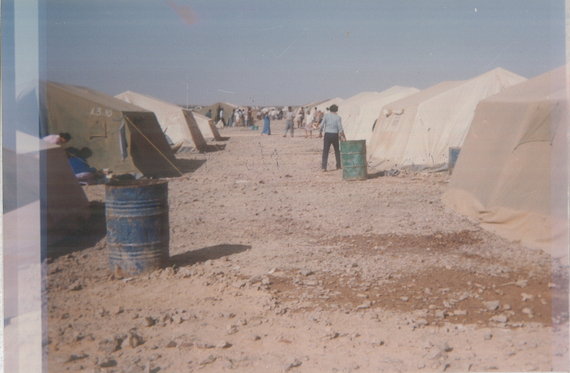
Al Azraq Camp - our home for five days
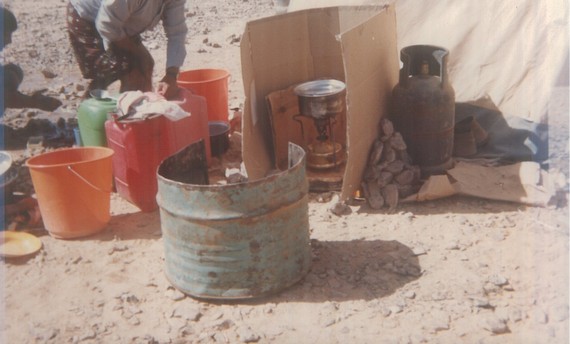
The cooking set up provided by the Red Cross
The next day we went exploring. Toilets were trenches covered with tin sheets--they were smelly but they had to do. There was a tent that substituted as a washroom for the women and we finally had a bath after five days on the road. Besides the Red Cross ration of rice, milk and apples, our men went foraging each day among the tents that were cleared out and often came back with goodies like a bar of chocolate, a tin of tea powder or even a packet of chewing gum. All such things were now luxuries to us refugees.
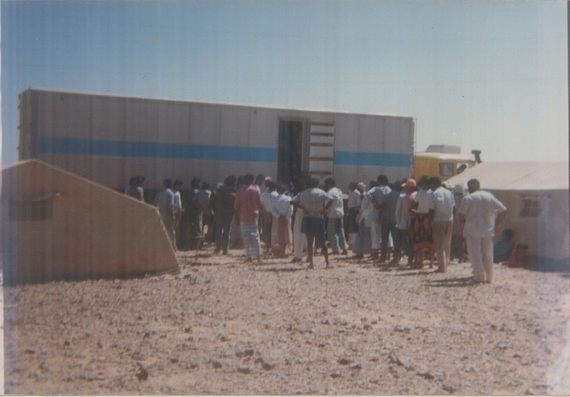
Standing in line for Red Cross rations
We are going home
On 3 October, we were told that we would be leaving for Jordon airport. We dressed in a jiffy only to be told that we would be taken to yet another camp as Jordon airport just could not handle the refugee influx. That night we spent at camp Al-Andalus, very close to Amman airport. The security made it very clear that the tents were only for the women and children and that any man caught in a tent would be locked up, no questions asked.
"When we disembarked at Mumbai airport, it did us proud to see how much our country had done for us."
The temperature was around seven degrees and I still remember how all our mums enveloped us with their bodies to keep us warm. The next morning, a bus took us to the airport and we saw a multitude of people in lines that seemed to be snaking into eternity. The heavens smiled on us that day because we were suddenly herded on to an Emirates mercy flight that had just been pressed in to service much to the chagrin of the people who had been waiting for days.
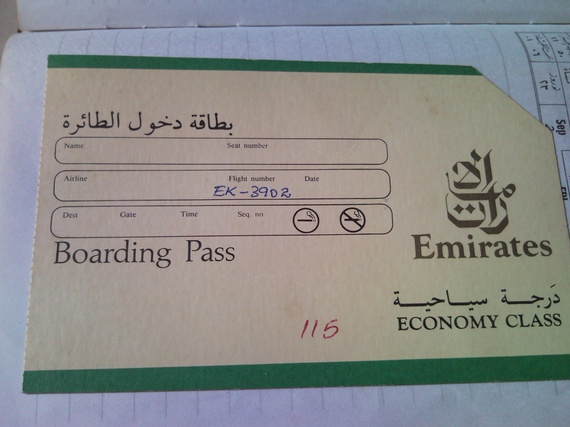
Our boarding pass on the Emirates mercy flight home
When we disembarked at Mumbai airport, it did us proud to see how much our country had done for us. There were representatives from every state at designated counters that were providing free travel to our respective home towns by train or bus. But we had had enough. We managed to board a one-hour flight the next day and reached our home town of Mangalore on 6 October 1990, approximately a week after we left Kuwait.
I am 37 years old today, and the memories are a bit hazy but echoes of it will follow me forever. After all, I was a part of history.
 Like Us On Facebook |
Like Us On Facebook |  Follow Us On Twitter |
Follow Us On Twitter |